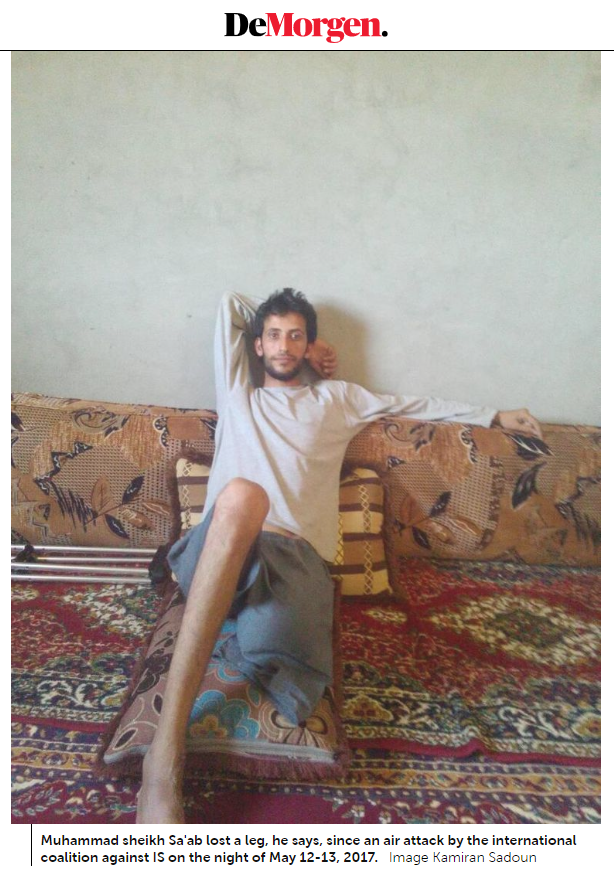Incident Code
Incident Date
Location
Geolocation
Geolocation
Airwars Assessment
(Previous Incident Code: S711)
Between 10 and 20 civilians – including “entire families” – died and dozens more were wounded in a casualty event at Al-Asadeya farm. Most sources attributed the incident to Kurdish artillery, and only one blamed the US-led Coalition. The alliance later admitted responsibility for ten deaths.
It was later revealed that the strike was either by French or Belgian forces – though both countries refuse to say more.
Syrian Press Center reported that “attacks by the military aircraft of the International coalition on Asadiya farm, north of the city of Raqqa, yesterday morning left dozens of dead and wounded civilians in addition to much destruction of the village”.
However, other sources believed that shelling by Kurdish artillery was responsible. According to Step News Agency, 20 died and dozens more were injured. Alaraby pointed at both strikes by warplanes and artillery, putting the death toll at 10.
All4Syria – which also attributed the event to Kurdish artillery – listed victims in addition to those named below as: One of the sons of Shawadi; Abu Baraa’s entire family; The whole family of Al-Taheri; and a displaced person on the farm
The Coalition’s August 2017 civilian casualty report noted: “During a strike on ISIS fighters, it was assessed that 10 civilians were unintentionally killed in a building adjacent to the target.” Officials provided Airwars with the location for this incident, accurate to within a one metre box.
In March 2020, Airwars, Liberation and De Morgen published a joint investigation revealing that Belgium and France were refusing to accept responsibility for civilian harm in this and other events – despite all other allies ruling themselves out.
Asked to say whether its aircraft were responsible for officially declared civilian harm in up to nine incidents, the Belgian Ministry of Defence told Airwars by email: “For the year 2017, BAF [Belgian Armed Forces] was certainly not involved in all events. With regard to the other data given, BAF was no longer present in theatre. BAF completed its role at the end of 2017. Our conclusion is that all ROEs [rules of engagement] were respected as confirmed by our federal court.”
After confirming receipt from Airwars in June 2019 of details of possible French civilian casualty events, the defence ministry then ceased communication – refusing to answer all subsequent emails.
In its own investigation, De Morgen featured Muhammad Sheikh Sa’ab, whose leg was amputated following a likely Belgian or French airstrike on May 12th-13th 2017 [translation]:
“26-year-old Muhammad Sheikh Sa’ab sprawled out on some pillows in his home in Assadiyah, a small town just outside Raqqa. He prefers not to have his prosthesis photographed. He is missing a leg, in his own words, since an air attack by the international coalition against IS on the night of May 12-13, 2017.
‘We were all in the house when the Coalition bombs fell. My younger brother died in the process. He was 21 years old. Mahmoud was not a warrior, but an ordinary citizen. My neighbour Muhamad Al Nasih also died, as did a refugee from elsewhere in Syria who lived here. ‘
“… The international coalition regularly shared information about incidents involving civilian casualties, after its own evaluations or after reports in the local press and social media. That happened, for example, after the air raid on Assadiyah, in which Muhammad sheikh Sa’ab lost his leg. Several reports in the day after that attack reported civilian deaths. In the list of victims that became so famous, the brother of Muhammad sheikh Sa’ab is not included, but his 55-year-old neighbour, Muhamad Al Nasih, and the displaced person.
“Several witnesses in Assadiyah confirm to De Morgen that Muhammad Sheikh Sa’ab indeed lost his leg, that his brother died and that his father was injured by shrapnel shards. They are talking about ten to fifteen deaths. In an August 2017 report, the international coalition itself states that it is “credible” that civilian deaths occurred in this airstrike. “It has been judged that an attack on IS (fighters) killed ten civilians unintentionally in a building adjacent to the target.”
According to De Morgen, neither the defence ministry nor the Government wished to respond publicly to that list of incidents, even now that the operation is over, since Belgium may send its F-16s again later this year.
“We don’t want to set a precedent or start a polemic with other coalition partners,” the a Cabinet official said, citing the ‘many nations, one mission’ concept. If a country replies in the negative to a specific incident, it may lead towards other potential actors in that airstrike being identified. During the war against ISIS, this also had security implications, because civilian deaths can lead to revenge actions, government officials claimed.
“None of the authorities or the Coalition have visited us,” Muhammad Sheikh Sa’ab told De Morgen. “That artificial leg has cost me handsfull of money, all paid out of my own pocket.”
Victims
Family members (3)

